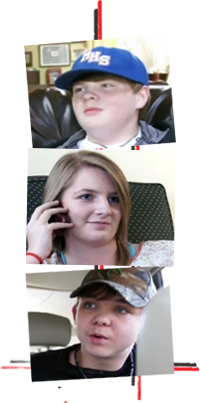Tips: How to deal with Peer Pressure to Use Drugs

The choice to try drugs is yours alone. The decision you make about drug use affect
not only you, but the people around you too. Adolescence can be a difficult time.
It's a time when you experience all sorts of pressures with friends, family and
school, and it can also be a time when you make some very important decisions that
will have an impact on the rest of your life. Opting to be drug free is one of these
important decisions. It may be difficult at times, but you can stay above the pressures
in life by thinking and speaking up for yourself.

Tips for Saying "Nah, I’m Good"
It can be difficult to say no to friends or peers without offending them or feeling
singled out. Here are some ideas you can build off of:
|
|
|
|
Nah, I’m good...
respect my decisions and I’ll respect yours.
|
|
|
|
|
|
|
|
|
Nah, I'm good...
I'm not into that stuff.
|
|
|
|
|
|
|
|
|
Nah, I’m good...
I'm already late for work.
|
|
|
|
|
|
|
|
|
Nah, I’m good...
I can't take a chance with my asthma (or bronchitis,
or any other health problem that could be worsened by drug use).
|
|
|
|
|
|
|
|
|
Nah, I’m good...
I don't want to end up like that "has-been"
celebrity
|
|
|
|
|
|
|
|
|
Nah, I’m good...
I don't have the time, I've already promised to meet
(insert name).
|
|
|
|
|
In cases where you feel strongly pressured, focus on something that is important
to you (for example, your girlfriend/boyfriend, music, art, family, dream job, getting
good grades, spirituality, etc.) and remind yourself of it whenever saying "no"
becomes difficult. After all, do you want to jeopardize the things in your life
that are important to you?
Making the Right Choice for You

Here are some other tips in helping you make the right choice:
- Know the facts on drugs. Identify drug situations and plan an exit strategy ahead
of time.
- Know yourself: You have a voice and a choice – use them both!
- Trust your instincts. If you do not feel comfortable in a situation where drugs
are present, exit it!
- Hang with "supporters". If you go out to a party, go with a close friend who respects
your choice.
- Talk with an adult or teacher.

Help a Friend
If you think that you or a friend might have a problem with drugs, remember that
admitting it is the first step to dealing with it. There are a lot of people available
to help you. Here are some problem signs a person can look for.
The person may:
- start doing drugs to deal with their problems;
- feel like they need to use drugs before school, or while they are at school;
- be bored with what used to be their favorite activity unless they're using drugs;
- choose to do things because they'll be able to use drugs;
- stop doing activities where they can't use drugs;
- stop spending time with certain friends if the friends don't like to use drugs;
- choose new friends because the friends like to use drugs with them;
- find it takes more and more drugs to actually get high;
- spend a lot more money than before on drugs;
- have trouble remembering things;
- feel sad, angry or anxious when they are not using drugs;
- use drugs by themselves;
- like to use drugs first thing in the morning;
- have to choose between using drugs and taking care of basic duties at home, work
or school;
- argue and fight more than before with people they care about;
- always want to use drugs;
- not be as alert as usual;
- take serious risks just to use drugs, like going to dangerous areas where drug dealers
hang out;
- start trying new types of drugs to try to get a more intense high; and/or
- start mixing drugs together to try to get a more intense high.
If someone has one or two of these symptoms, it doesn't mean they have a serious
problem. If they have lots of these symptoms, it is time for them to recognize they
might have a drug problem. Remember, problems with drugs can creep up on someone
and it's much easier to deal with them early. The longer they wait, the harder it
is to deal with because the brain and body take over and the cravings are very difficult
to control.

Talk to an Adult
Does the idea of talking with an adult about drugs feel a little awkward? That's
not surprising. After all, you don't want to talk with just anybody about these
things. But you may be surprised by the support your parents or guardians can give
you. After all, they want you to be able to make healthy choices.
Why Talk with Parents or Other Trusted Adults?
Parents, guardians or other trusted adults can give you advice or a different perspective
to help you make healthy decisions. Believe it or not, most young teens consider
their parents to be credible sources of information about illegal drugs use. For
most youth, parents or guardians remain one of the most influential persons in their
lives.